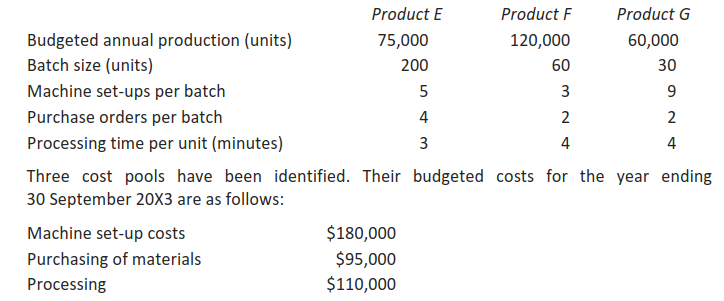快速查題-ACCA英國注冊會計師試題
- 不限題型
- 不定項選擇題
- 單選題
- 填空題
- 材料題
- 簡答題
- 論述題
Which of the following statements about standard costing is NOT correct??
?Which type of standard cost is most useful for monitoring trends in performance over time??
?Which of the following describes a 'basic standard' within the context of budgeting??
Which of the following statements about standard costing is NOT true??
?EFG uses an Activity Based Budgeting system. It manufactures three products, budgeted?details of which are set out below:?
 What is the budgeted machine set-up cost per unit of product F??
What is the budgeted machine set-up cost per unit of product F??
The following statements have been made regarding different types of budget:
?(i) A flexible budget can be used to control operational efficiency.?
(ii) Incremental budgeting can be defined as a system of budgetary planning and control?that measures the additional costs that are incurred when there are unplanned extra?units of activity.?
(iii) Rolling budgets review and, if necessary, revise the budget for the next quarter to?ensure that budgets remain relevant for the remainder of the accounting period.?
Which of the above statement(s) are true??
X Co uses rolling budgeting, updating its budgets on a quarterly basis. After carrying out the?last quarter’s update to the cash budget, it projected a forecast cash deficit of $400,000 at?the end of the year. Consequently, the planned purchase of new capital equipment has?been postponed.?
Which of the following types of control is the sales manager’s actions an example of??
?Which of the following statements regarding zero based budgeting are correct??
(1) It is best applied to support expenses rather than to direct costs.?
(2) It can link strategic goals to specific functional areas.?
(3) It carries forward inefficiencies from previous budget periods.?
(4) It is consistent with a top-down budgeting approach.?
The following statements have been made about the drawbacks of activity-based?budgeting:??
(1) It is not always useful or applicable, as in the short term many overhead costs are not?controllable and do not vary directly with changes in the volume of activity for the?cost driver.?
(2) ABB will not be able to provide useful information for a total quality management?programme (TQM).?
Which of the above statement(s) is/are true??
?Incremental budgeting is widely used and is a particularly efficient form of budgeting.?
